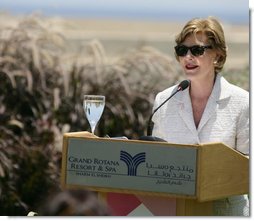
 |
For Immediate Release
Office of the First Lady
May 18, 2008
Mrs. Bush's Remarks on the U.S.-Middle East Partnership for Breast Cancer Awareness and Research
Grand Rotana Resort
Sharm el Sheikh, Egypt
12:47 P.M. (Local)
MRS. BUSH: Thank you very much, Mr. Minister, and congratulations to you and to Egypt on those very good statistics that you've given us about defeating infectious diseases. And I guess what we find out as our countries develop is we can live longer and healthier lives, and then we're more likely to now have to address cancers and things that happen in people as they live longer.
 Thank you all very much for joining me today, both the ministers
here, the doctors, the health officials, the researchers, the advocates,
the government representatives and the breast cancer survivors -- thank
you very much for being here. I want to thank you for the work that
you're doing to save women's lives by raising awareness of breast cancer
and by expanding screenings and treatment.
Thank you all very much for joining me today, both the ministers
here, the doctors, the health officials, the researchers, the advocates,
the government representatives and the breast cancer survivors -- thank
you very much for being here. I want to thank you for the work that
you're doing to save women's lives by raising awareness of breast cancer
and by expanding screenings and treatment.
Mrs. Mubarak, thank you very much, Suzanne. Thank you for your friendship. And I knew, of course, you would also be a leader in women's health, just like you are in education for girls and for women. So thank you for joining us today.
Breast cancer is Egypt's most common form of cancer among women. Yet, as in many countries, shame continues to surround a diagnosis of breast cancer. And I know that everyone here is working to eliminate this stigma and to educate women about how important early detection is and to let them know that a breast cancer diagnosis is not a death sentence.
The United States is proud to support you in these efforts. Twenty-five years ago in the United States, American women were too embarrassed to talk about breast cancer. We didn't know to get regular mammograms or to do breast self-exams. And as a result, most breast cancer cases were diagnosed too late for successful treatment.
But a lot has changed since then. Two former First Ladies, Betty Ford and Nancy Reagan, helped expand awareness of breast cancer by making their own struggles with breast cancer public. And, in 1982, my good friend and our Ambassador and Chief of Protocol, who happens to be with us today, Nancy Brinker, founded the Susan G. Komen Foundation in honor of her sister Susan, who had died of breast cancer.
Today American women all know what the pink ribbon stands for -- which side is it on? They know to do breast self-exams and to get mammograms, yearly mammograms. They know to know what their family history of breast cancer is so they can protect themselves. And now American women are speaking out on breast cancer and talking about survival, including my mother, Jenna Welch, who is a breast cancer survivor.
The new U.S.-Middle East Partnership for Breast Cancer Awareness and Research is helping us pass on what we've learned so that more women who are diagnosed with breast cancer in the early stages when the survival chances are greatest. This Middle East Partnership, U.S. Partnership, is bringing together advocates and researchers in both of our regions to raise awareness and to share discoveries that we pray will lead to a cure.
Already the Partnership is showing signs of progress in Jordan, the United Arab Emirates, and Saudi Arabia. In the months following the Partnership's launch in Saudi Arabia, for example, the number of women receiving breast cancer screenings at the Abdullatif Cancer Screening Center has increased almost five-fold.
I met with some of these women this week during a visit to the King Fahd Medical City in Riyadh. They told me that the Partnership's awareness campaign gave them courage to seek a diagnosis instead of hiding their symptoms of breast cancer.
Today these women are receiving treatment that may save their lives. And by bravely telling their stories, just like you did, they're empowering other women to take charge of their own health.
To maximize our cooperation, USAID is funding a comprehensive baseline assessment of breast cancer in Egypt. This analysis will include a survey on how the disease is affecting Egyptian women, an inventory of the resources available to prevent it, and recommendations for a program that can address breast cancer screening, diagnosis, and treatment.
Today I'm pleased to announce that the U.S.-Middle East Partnership for Breast Cancer Awareness and Research will conduct a similar breast cancer analysis and breast cancer services and awareness in the Palestinian Territories. We're glad that the Palestinian Ministry of Health is playing a key leadership role in the development and implementation of this important project.
This Partnership is also reaching out to potential partners in Morocco to craft a targeted response to that country where approximately 20 new cases of breast cancer are detected daily.
All of these efforts will help lay the groundwork for new interventions to ensure that women are receiving the screenings and the treatments they need. And with the hope -- we hope that with the support from other governments in the region, these efforts can expand to include more countries, more doctors, and more women, and of course, we hope more researchers, so that working together we can find out how to best treat breast cancer and what we can do to develop a cure.
Thank you all very, very much. (Applause.)
END 12:53 P.M. (Local)